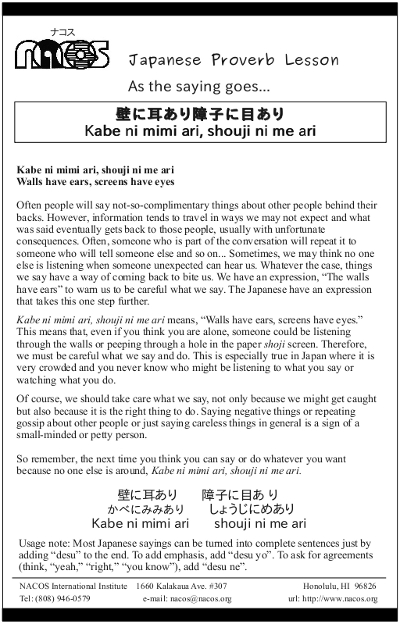Kabe ni mimi ari, shouji ni me ari
Walls have ears, screens have eyes
Often people will say not-so-complimentary things about other people behind their backs. However, information tends to travel in ways we may not expect and what was said eventually gets back to those people, usually with unfortunate consequences. Often, someone who is part of the conversation will repeat it to someone who will tell someone else and so on... Sometimes, we may think no one else is listening when someone unexpected can hear us. Whatever the case, things we say have a way of coming back to bite us. We have an expression, “The walls have ears” to warn us to be careful what we say. The Japanese have an expression that takes this one step further.
Kabe ni mimi ari, shouji ni me ari means, “Walls have ears, screens have eyes.” This means that, even if you think you are alone, someone could be listening through the walls or peeping through a hole in the paper shoji screen. Therefore, we must be careful what we say and do. This is especially true in Japan where it is very crowded and you never know who might be listening to what you say or watching what you do.
Of course, we should take care what we say, not only because we might get caught but also because it is the right thing to do. Saying negative things or repeating gossip about other people or just saying careless things in general is a sign of a small-minded or petty person.
So remember, the next time you think you can say or do whatever you want because no one else is around, Kabe ni mimi ari, shouji ni me ari.
Usage note: Most Japanese sayings can be turned into complete sentences just by adding “desu” to the end. To add emphasis, add “desu yo”. To ask for agreements (think, “yeah,” “right,” “you know”), add “desu ne”.


